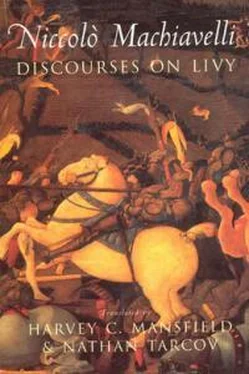Николо Макиавелли - Discourses on Livy
Здесь есть возможность читать онлайн «Николо Макиавелли - Discourses on Livy» весь текст электронной книги совершенно бесплатно (целиком полную версию без сокращений). В некоторых случаях можно слушать аудио, скачать через торрент в формате fb2 и присутствует краткое содержание. Год выпуска: 2014, Издательство: epubBooks Classics, Жанр: История, Философия, на английском языке. Описание произведения, (предисловие) а так же отзывы посетителей доступны на портале библиотеки ЛибКат.
- Название:Discourses on Livy
- Автор:
- Издательство:epubBooks Classics
- Жанр:
- Год:2014
- ISBN:нет данных
- Рейтинг книги:5 / 5. Голосов: 1
-
Избранное:Добавить в избранное
- Отзывы:
-
Ваша оценка:
- 100
- 1
- 2
- 3
- 4
- 5
Discourses on Livy: краткое содержание, описание и аннотация
Предлагаем к чтению аннотацию, описание, краткое содержание или предисловие (зависит от того, что написал сам автор книги «Discourses on Livy»). Если вы не нашли необходимую информацию о книге — напишите в комментариях, мы постараемся отыскать её.
Discourses on Livy — читать онлайн бесплатно полную книгу (весь текст) целиком
Ниже представлен текст книги, разбитый по страницам. Система сохранения места последней прочитанной страницы, позволяет с удобством читать онлайн бесплатно книгу «Discourses on Livy», без необходимости каждый раз заново искать на чём Вы остановились. Поставьте закладку, и сможете в любой момент перейти на страницу, на которой закончили чтение.
Интервал:
Закладка:
No man, therefore, of warlike genius, need despair of creating a good army if only he have the men; for the prince who has many subjects and yet lacks soldiers, has only to thank his own inertness and want of foresight, and must not complain of the cowardice of his people.
Chapter XXXIX
That a Captain Should Have Good Knowledge of Places.
Among other qualifications essential in a good captain is a knowledge, both general and particular, of places and countries, for without such knowledge it is impossible for him to carry out any enterprise in the best way. And while practice is needed for perfection in every art, in this it is needed in the highest degree. Such practice, or particular knowledge as it may be termed, is sooner acquired in the chase than in any other exercise; and, accordingly, we find it said by ancient historians that those heroes who, in their day, ruled the world, were bred in the woods and trained to the chase; for this exercise not merely gives the knowledge I speak of, but teaches countless other lessons needful in war. And Xenophon in his life of Cyrus tells us, that Cyrus, on his expedition against the King of Armenia, when assigning to each of his followers the part he was to perform, reminded them that the enterprise on which they were engaged, differed little from one of those hunting expeditions on which they had gone so often in his company; likening those who were to lie in ambush in the mountains, to the men sent to spread the toils on the hill–tops; and those who were to overrun the plain, to the beaters whose business it is to start the game from its lair that it may be driven into the toils. Now, this is related to show how, in the opinion of Xenophon, the chase is a mimic representation of war, and therefore to be esteemed by the great as useful and honourable.
Nor can that knowledge of countries which I have spoken of as necessary in a commander, be obtained in any convenient way except by the chase. For he who joins therein gains a special acquaintance with the character of the country in which it is followed; and he who has made himself specially familiar with one district, will afterwards readily understand the character of any strange country into which he comes. For all countries, and the districts of which they are made up, have a certain resemblance to one another, so that from a knowledge of one we can pass easily to the knowledge of another. He therefore who is without such practical acquaintance with some one country, can only with difficulty, and after a long time, obtain a knowledge of another, while he who possesses it can take in at a glance how this plain spreads, how that mountain slopes, whither that valley winds, and all other like particulars in respect of which he has already acquired a certain familiarity.
The truth of what I affirm is shown by Titus Livius in the case of Publius Decius, who, being military tribune in the army which the consul Cornelius led against the Samnites, when the consul advanced into a defile where the Roman army were like to be shut in by the enemy, perceiving the great danger they ran, and noting, as Livius relates, a hill which rose by a steep ascent and overhung the enemy's camp, and which, though hard of access for heavy–armed troops, presented little difficulty to troops lightly armed, turned to the consul and said:—" Seest thou, Aulus Cornelius, yonder height over above the enemy, which they have been blind enough to neglect? There, were we manfully to seize it, might we find the citadel of our hopes and of our safety. " Whereupon, he was sent by the consul with three thousand men to secure the height, and so saved the Roman army. And as it was part of his plan to make his own escape and carry off his men safely under shelter of night, Livius represents him as saying to his soldiers:—" Come with me, that, while daylight still serves, we may learn where the enemy have posted their guards, and by what exit we may issue hence. " Accordingly, putting on the cloak of a common soldier, lest the enemy should observe that an officer was making his rounds he surveyed their camp in all directions.
Now any one who carefully studies the whole of this passage, must perceive how useful and necessary it is for a captain to know the nature of places, which knowledge had Decius not possessed he could not have decided that it would be for the advantage of the Roman army to occupy this hill; nor could he have judged from a distance whether the hill was accessible or no; and when he reached the summit and desired to return to the consul, since he was surrounded on all sides by the enemy, he never could have distinguished the path it was safe for him to take, from those guarded by the foe. For all which reasons it was absolutely essential that Decius should have that thorough knowledge which enabled him by gaining possession of this hill to save the Roman army, and to discover a path whereby, in the event of his being attacked, he and his followers might escape.
Chapter XL
That Fraud is Fair in War.
Although in all other affairs it be hateful to use fraud, in the operations of war it is praiseworthy and glorious; so that he who gets the better of his enemy by fraud, is as much extolled as he who prevails by force. This appears in the judgments passed by such as have written of the lives of great warriors, who praise Hannibal and those other captains who have been most noted for acting in this way. But since we may read of many instances of such frauds, I shall not cite them here. This, however, I desire to say, that I would not have it understood that any fraud is glorious which leads you to break your plighted word, or to depart from covenants to which you have agreed; for though to do so may sometimes gain you territory and power, it can never, as I have said elsewhere, gain you glory.
The fraud, then, which I here speak of is that employed against an enemy who places no trust in you, and is wholly directed to military operations, such as the stratagem of Hannibal at the Lake of Thrasymene, when he feigned flight in order to draw the Roman consul and his army into an ambuscade; or when to escape from the hands of Fabius Maximus he fastened lights to the horns of his oxen. Similar to the above was the deceit practised by Pontius the Samnite commander to inveigle the Roman army into the Caudine Forks. For after he had drawn up his forces behind the hills, he sent out a number of his soldiers, disguised as herdsmen, to drive great herds of cattle across the plain; who being captured by the Romans, and interrogated as to where the Samnite army was, all of them, as they had been taught by Pontius, agreed in saying that it had gone to besiege Nocera: which being believed by the consuls, led them to advance within the Caudine Valley, where no sooner were they come than they were beset by the Samnites. And the victory thus won by a fraud would have been most glorious for Pontius had he but taken the advice of his father Herennius, who urged that the Romans should either be set at liberty unconditionally, or all be put to death; but that a mean course " which neither gains friends nor gets rid of foes " should be avoided. And this was sound advice, for, as has already been shown, in affairs of moment a mean course is always hurtful.
Chapter XLI
That Our Country is to be Defended by Honour or by Dishonour; and in Either Way is Well Defended.
The consuls together with the whole Roman army fell, as I have related, into the hands of the Samnites, who imposed on them the most ignominious terms, insisting that they should be stripped of their arms, and pass under the yoke before they were allowed to return to Rome. The consuls being astounded by the harshness of these conditions and the whole army overwhelmed with dismay, Lucius Lentulus, the Roman lieutenant, stood forward and said, that in his opinion they ought to decline no course whereby their country might be saved; and that as the very existence of Rome depended on the preservation of her army, that army must be saved at any sacrifice, for whether the means be honourable or ignominious, all is well done that is done for the defence of our country. And he said that were her army preserved, Rome, in course of time, might wipe out the disgrace; but if her army were destroyed, however gloriously it might perish, Rome and her freedom would perish with it. In the event his counsel was followed.
Читать дальшеИнтервал:
Закладка:
Похожие книги на «Discourses on Livy»
Представляем Вашему вниманию похожие книги на «Discourses on Livy» списком для выбора. Мы отобрали схожую по названию и смыслу литературу в надежде предоставить читателям больше вариантов отыскать новые, интересные, ещё непрочитанные произведения.
Обсуждение, отзывы о книге «Discourses on Livy» и просто собственные мнения читателей. Оставьте ваши комментарии, напишите, что Вы думаете о произведении, его смысле или главных героях. Укажите что конкретно понравилось, а что нет, и почему Вы так считаете.











